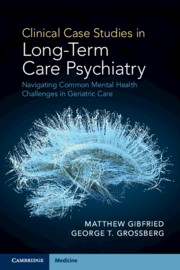 Clinical Case Studies in Long-Term Care Psychiatry
Clinical Case Studies in Long-Term Care Psychiatry Schizoaffective Disorder and Antipsychotics
Published online by Cambridge University Press: 31 October 2024
Schizoaffective disorder is a psychiatric disorder in which patients demonstrate a combination of symptoms associated with schizophrenia and a mood disorder such as bipolar disorder or depression. The symptoms of schizophrenia and mood disorder occur concomitantly for a substantial portion of the illness duration. If a resident has been stable on a psychiatric drug regimen, it is advisable to avoid any major change because obtaining a similar good therapeutic response from a different drug regimen is not predictable or assured. All antipsychotics have the potential to cause weight gain and increase the risk of obesity and related hyperlipidemia and diabetes. Atypical antipsychotics can be thought of as being high, medium, and low risk for these complications. Antipsychotics thought to be low risk for metabolic syndrome include cariprazine, lurasidone, lumateperone, ziprasidone, pimavanserin, aripiprazole, and brexpiprazole.
To save this book to your Kindle, first ensure [email protected] is added to your Approved Personal Document E-mail List under your Personal Document Settings on the Manage Your Content and Devices page of your Amazon account. Then enter the ‘name’ part of your Kindle email address below. Find out more about saving to your Kindle.
Note you can select to save to either the @free.kindle.com or @kindle.com variations. ‘@free.kindle.com’ emails are free but can only be saved to your device when it is connected to wi-fi. ‘@kindle.com’ emails can be delivered even when you are not connected to wi-fi, but note that service fees apply.
Find out more about the Kindle Personal Document Service.
To save content items to your account, please confirm that you agree to abide by our usage policies. If this is the first time you use this feature, you will be asked to authorise Cambridge Core to connect with your account. Find out more about saving content to Dropbox.
To save content items to your account, please confirm that you agree to abide by our usage policies. If this is the first time you use this feature, you will be asked to authorise Cambridge Core to connect with your account. Find out more about saving content to Google Drive.